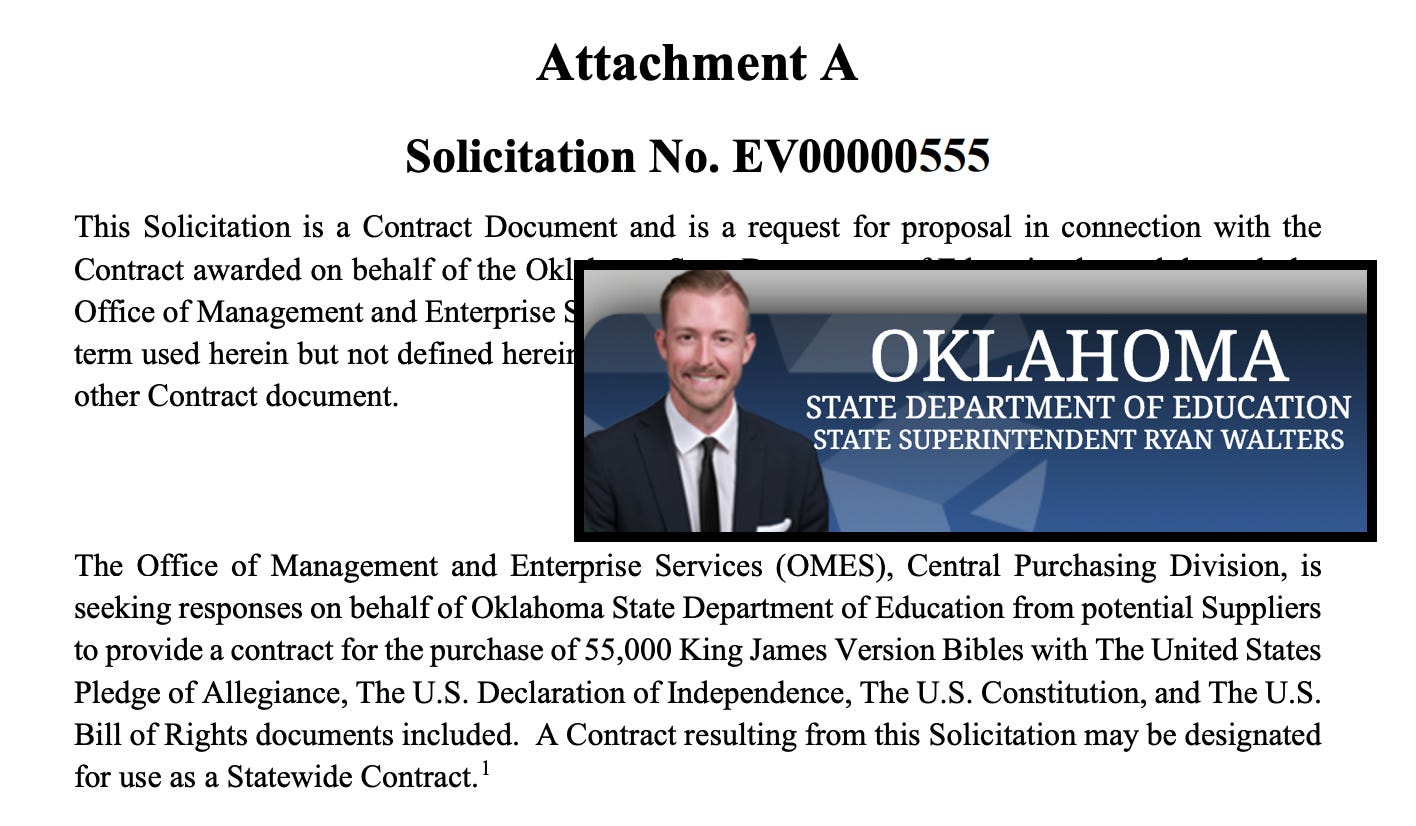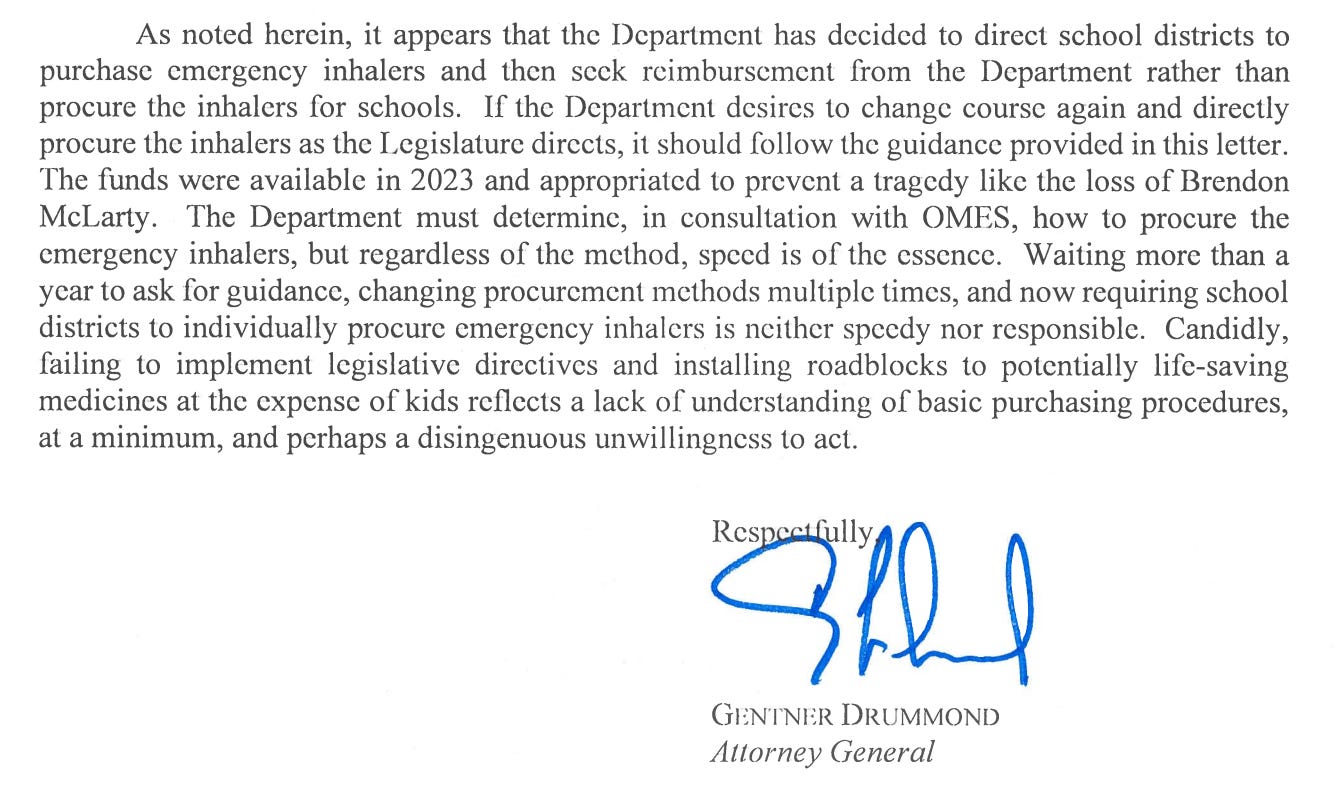This man appears to want Trump Bibles, not inhalers, for Oklahoma's children
Ryan Walters is supposed to be Oklahoma's "Superintendent of Public Instruction." Also: Jack Smith's immunity filing. And: New cases for the new SCOTUS term.
Two stories this week that are bad on their own become intolerable when seen in tandem.
They both involve Oklahoma Superintendent of Public Instruction Ryan Walters. Walters is a far-right figure, even in Oklahoma, and his actions this week show how that comes at the expense — quite literally — of children.
The story that’s gotten traction over the past few days is a Request for Proposal (RFP) that went out this Monday, Sept. 30, looking to award a contract for “the purchase of 55,000 King James Version Bibles with The United States Pledge of Allegiance, The U.S. Declaration of Independence, The U.S. Constitution, and The U.S. Bill of Rights documents included.“
Yes, it’s capital “B” Bad on its face. But, that’s not all. First, that is not all that the RFP requires:
As others have noted, that unusual combination of documents is not common in one book. It is, however, found in at least two Bibles — one backed by Donald Trump and another backed by Donald Trump Jr., as The Oklahoman reported.
In short, this could be a combination of religious indoctrination in public schools and good old-fashioned graft.
The RFP closes on Oct. 14 — a two-week turnaround.
That would be enough, but then I saw this letter from Oklahoma Attorney General Gentner Drummond. Drummond is a Republican — a quite conservative one on many issues — but one who is willing to break ranks with his fellow Republicans at times. On Oct. 2, Drummond responded to a request from Walters about the purchase of inhalers for Oklahoma’s children.
In the letter, Drummond all but accuses Walters of dragging his feet to make inhalers available to children in Oklahoma’s schools. The man who is rushing Bible purchases for schools across Oklahoma has taken well over a year — with still no resolution — to get emergency inhalers put into schools after funding was made available. The efforts in the state have expanded in recent years after a child in the state died at school when he had an asthma attack and no access to an inhaler.
As the letter details, $250,000 in funding for the emergency inhalers became available on July 1, 2023. Walters’s department, however, “did not issue a Request for Information ("RFI") to examine potential suppliers of the inhalers until February 9, 2024 — more than seven months after the funds were appropriated and available.” That was not, Drummond noted, an RFP that could result in a contract being awarded. What’s more, Drummond added that Walters has basically given up, writing, “[I]t appears that you have elected to require school districts to directly purchase inhalers and be refunded rather than procuring inhalers directly.”
Drummond went on to detail the efforts of the legislature to support inhalers in schools, noting that “as of July 1, 2023, the Department was responsible for procuring the emergency inhalers for all schools.” After detailing how the department could go about obtaining the inhalers directly, Drummond’s conclusion — again, from one Republican official to another — is shocking to read:
“Candidly, failing to implement legislative directives and installing roadblocks to potentially life-saving medicines at the expense of kids reflects a lack of understanding of basic purchasing procedures, at a minimum, and perhaps a disingenuous unwillingness to act,” Drummond concluded.
But, on October 14, the RFP for the Bible purchases will close.
The second message in Jack Smith’s brief
Special Counsel Jack Smith’s brief made public on Wednesday — technically the “Government’s Motion for Immunity Determinations“ — is a damning document. It is damning of Donald Trump and his enablers — including his “co-conspirators” — but it also, with a light touch, repeatedly questions the decisions made by Chief Justice John Roberts in his July decision for the U.S. Supreme Court in Trump v. United States.
I write “light touch” because Smith is smart and knows that, should the case continue after the election (i.e., should Vice President Kamala Harris win), it’s eventually going back up to Roberts and the others.
The the 165-page motion was posted on the docket shortly after U.S. District Judge Tanya Chutkan issued an order granting Smith’s request to file a version of the document with redactions. That led to extensive chatter about who’s who among the redacted individuals, with some being extremely obvious, others taking a little work to figure out, and some not quite being clear. But, if you want to figure all that out, you’ve probably already done it or read those stories.
Stepping back, what the motion contains is an extensive, 80-page presentation of evidence against Trump; a summary of the Supreme Court’s July immunity ruling; and a 76-page presentation of how Smith’s team believes Chutkan (Roberts) should apply that ruling to the evidence.
It is, at its most basic, Smith’s effort to call Roberts’s bluff.
He basically says, “I see your immunity ruling, and, whatever I might think of it, which isn’t much, I’ll go along.”
From the start, Smith argued:
The defendant asserts that he is immune from prosecution for his criminal scheme to overturn the 2020 presidential election because, he claims, it entailed official conduct. Not so. Although the defendant was the incumbent President during the charged conspiracies, his scheme was fundamentally a private one.
Although technically comments about Trump, the paragraph could just as easily have been rewritten about Roberts and Trump:
Roberts asserts that Trump is presumptively immune from prosecution for his criminal scheme to overturn the 2020 presidential election because, he claims, it entailed official conduct. Not so. Although Trump was the incumbent President during the charged conspiracies, his scheme was fundamentally a private one.
As to the portions of the superseding indictment against Trump that do include official acts — or, even, arguably official acts — Smith and team detail how and why Chutkan (read: Roberts) should rule that they have overcome the presumptive immunity that the Supreme Court found applies.
While holding back a bit, Smith did make clear that the Supreme Court didn’t need to leave so much up in the air. Just as Roberts was willing to declare outright that Trump’s engagement with Justice Department leaders was protected from criminal inquiry at all — that Trump had absolute immunity for those discussions — Smith shows in the third section of his motion how easy it could have been for the Supreme Court to do the same as to acts that were clearly not official.
Again, though, since the Supreme Court didn’t do so, Smith did in his motion.
Trump’s response, after a request for an extension, is now not due until Nov. 7 — two days after Election Day.
As with so much else, in other words, and as has been clear in this case since at least the July 1 immunity ruling, this is another contingent case, the future of which depends on the election’s outcome.
A new SCOTUS term comes into focus
On Friday morning, the U.S. Supreme Court announced that it has added 13 new arguments to its calendar for the term beginning Monday, granting certiorari in 15 new cases.
Among the cases is an effort by American gunmakers to stop Mexico’s lawsuit against them for what the gun manufacturers characterize as “harms inflicted by Mexican drug cartels.” The U.S. Court of Appeals for the First Circuit allowed some of Mexico’s claims to go forward — finding that they were potentially exempted from the Protection of Lawful Commerce in Arms Act, which bars most lawsuits against gun manufacturers — and the gun manufacturers are asking the Supreme Court to protect them by reversing that ruling.
The 13 arguments will be added to the 27 arguments in 28 cases that were granted before the court’s summer recess, and Law Dork will have more on the term as it gets going.
Many of the cases, as I’ve written, also figure into the contingent cases question, as the federal government’s position in cases could change in January depending on the election outcome. That is true of a number of Friday’s grants.







What I particularly like about this piece and others of yours that you write, is they are a reminder that Trump is only one part of the problem...we have serious issues in Congress, and in the states.
Really, really, REALLY bad people
I also believe that SC Smith's filing leaned in to J. Coney Barrett's commentary in trump v US, when she allowed that organizing a fake electors scheme would clearly be an "unofficial act", and I also believe that Coney Barrett will side with the three dissenting Justices in upholding the bulk of Smith's charges should they reach Scotus, and furthermore that J Kavanaugh may join for a 5-4 majority.
If tRump loses, even "Mr Immunity" himself, CJ Roberts, may as well be persuaded to cross over...even the self-righteous can read the room.